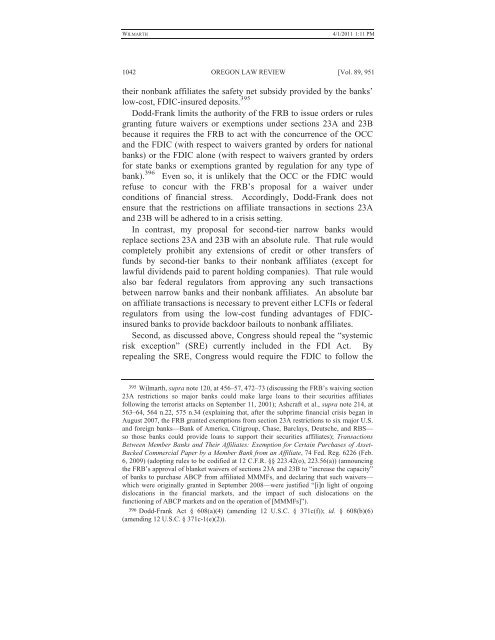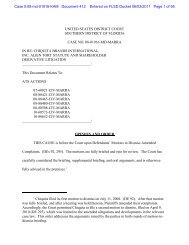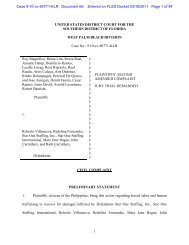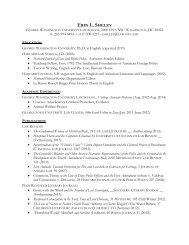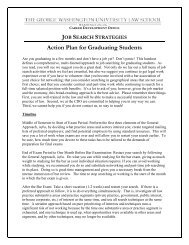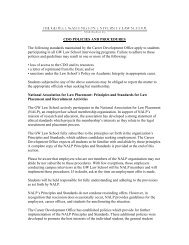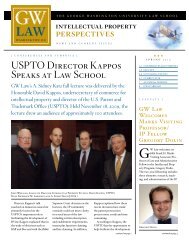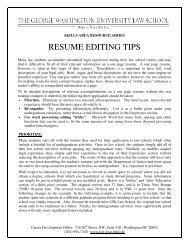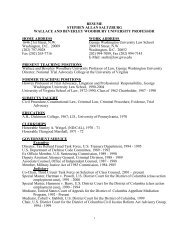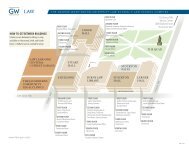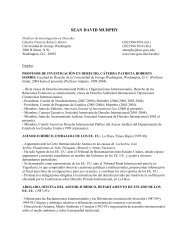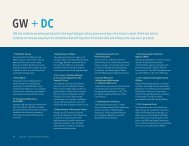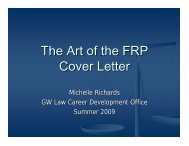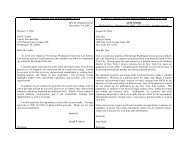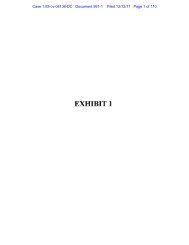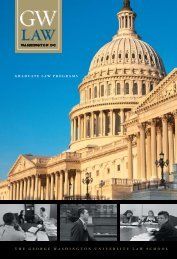CLE Materials for Panel #1 - George Washington University Law ...
CLE Materials for Panel #1 - George Washington University Law ...
CLE Materials for Panel #1 - George Washington University Law ...
Create successful ePaper yourself
Turn your PDF publications into a flip-book with our unique Google optimized e-Paper software.
WILMARTH<br />
4/1/2011 1:11 PM<br />
1042 OREGON LAW REVIEW [Vol. 89, 951<br />
their nonbank affiliates the safety net subsidy provided by the banks’<br />
low-cost, FDIC-insured deposits. 395<br />
Dodd-Frank limits the authority of the FRB to issue orders or rules<br />
granting future waivers or exemptions under sections 23A and 23B<br />
because it requires the FRB to act with the concurrence of the OCC<br />
and the FDIC (with respect to waivers granted by orders <strong>for</strong> national<br />
banks) or the FDIC alone (with respect to waivers granted by orders<br />
<strong>for</strong> state banks or exemptions granted by regulation <strong>for</strong> any type of<br />
bank). 396 Even so, it is unlikely that the OCC or the FDIC would<br />
refuse to concur with the FRB’s proposal <strong>for</strong> a waiver under<br />
conditions of financial stress. Accordingly, Dodd-Frank does not<br />
ensure that the restrictions on affiliate transactions in sections 23A<br />
and 23B will be adhered to in a crisis setting.<br />
In contrast, my proposal <strong>for</strong> second-tier narrow banks would<br />
replace sections 23A and 23B with an absolute rule. That rule would<br />
completely prohibit any extensions of credit or other transfers of<br />
funds by second-tier banks to their nonbank affiliates (except <strong>for</strong><br />
lawful dividends paid to parent holding companies). That rule would<br />
also bar federal regulators from approving any such transactions<br />
between narrow banks and their nonbank affiliates. An absolute bar<br />
on affiliate transactions is necessary to prevent either LCFIs or federal<br />
regulators from using the low-cost funding advantages of FDICinsured<br />
banks to provide backdoor bailouts to nonbank affiliates.<br />
Second, as discussed above, Congress should repeal the “systemic<br />
risk exception” (SRE) currently included in the FDI Act. By<br />
repealing the SRE, Congress would require the FDIC to follow the<br />
395 Wilmarth, supra note 120, at 456–57, 472–73 (discussing the FRB’s waiving section<br />
23A restrictions so major banks could make large loans to their securities affiliates<br />
following the terrorist attacks on September 11, 2001); Ashcraft et al., supra note 214, at<br />
563–64, 564 n.22, 575 n.34 (explaining that, after the subprime financial crisis began in<br />
August 2007, the FRB granted exemptions from section 23A restrictions to six major U.S.<br />
and <strong>for</strong>eign banks—Bank of America, Citigroup, Chase, Barclays, Deutsche, and RBS—<br />
so those banks could provide loans to support their securities affiliates); Transactions<br />
Between Member Banks and Their Affiliates: Exemption <strong>for</strong> Certain Purchases of Asset-<br />
Backed Commercial Paper by a Member Bank from an Affiliate, 74 Fed. Reg. 6226 (Feb.<br />
6, 2009) (adopting rules to be codified at 12 C.F.R. §§ 223.42(o), 223.56(a)) (announcing<br />
the FRB’s approval of blanket waivers of sections 23A and 23B to “increase the capacity”<br />
of banks to purchase ABCP from affiliated MMMFs, and declaring that such waivers—<br />
which were originally granted in September 2008—were justified “[i]n light of ongoing<br />
dislocations in the financial markets, and the impact of such dislocations on the<br />
functioning of ABCP markets and on the operation of [MMMFs]”).<br />
396 Dodd-Frank Act § 608(a)(4) (amending 12 U.S.C. § 371c(f)); id. § 608(b)(6)<br />
(amending 12 U.S.C. § 371c-1(e)(2)).


